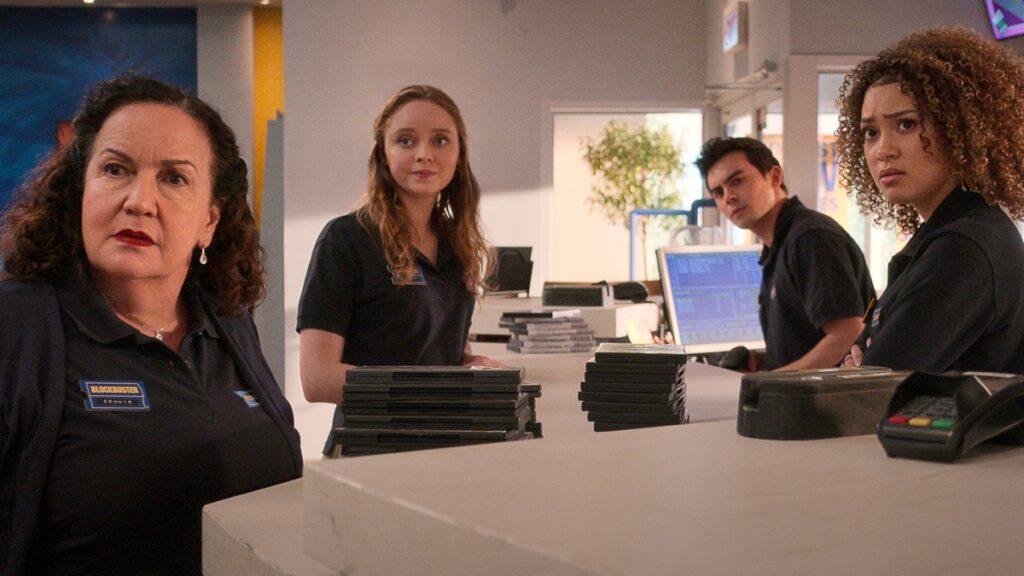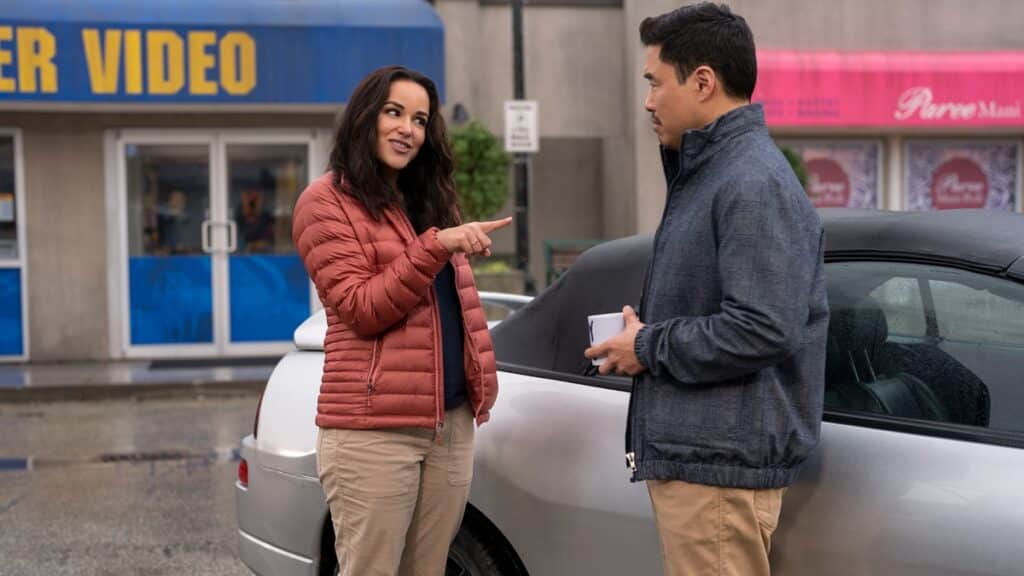Read also:
How to Watch FX Live Without CableHow To Watch AMC Without CableHow to Watch ABC Without CableHow to Watch Paramount Network Without CableNetflix’s bland sitcom attempt demonstrates why sometimes dead is better.
There is something delightfully ghastly about Netflix fictionalizing the existence of that last Blockbuster location on Earth. It’s the streaming equivalent of you or I parading the carcasses of our slain enemies through the town square. Alas, this “really rubbing salt in the wound” touchdown dance of a move is about the only thing unique about the sitcom.
Blockbuster begins moments before manager Timmy Woon (Randall Park) learns that corporate is dead. His store is now the last in existence. He, de facto, is the new owner-operator of this barely living anachronism. Rather than packing it in, Woon decides to try and keep the brand alive. He’s also keeping his teen existence on life support. He works in the same strip mall as his high school best friend Percy (J.B. Smoove). He has the same crush he had in high school, on his co-worker crush Eliza (Melissa Fumero). Occasionally he even has to mediate issues between his divorced but still actively fighting parents. He frequently conflates this hunger for security with his desire to look out for his other employees, including fellow middle-ager Connie (Olga Merediz) and teens: the naïve, penny-pinching Hannah (Madeleine Arthur), accounting student/would-be filmmaker Carlos (Tyler Alvarez), and Percy’s unhappy daughter Kayla (Kamaia Fairburn).

It isn’t like the pieces assembled here aren’t good choices. Show creator Vanessa Ramos knows her way around a workplace comedy, having worked for two of the best in recent memory, Brooklyn Nine-Nine and Superstore. The latter, in particular, about a big box store just after the era of big box store dominance, feels like a perfect warmup for chronicling a cultural relic barely holding on.
The cast is similarly legit. Park is consistently good in everything, somehow standing out in MCU productions and The Young Rock alike. And that’s not even getting into his turn on Fresh Off the Boat, where he plays a similar strain of optimistic businessman, albeit one far more mature and competent. Even more than Ramos, Fumero has plenty of workplace sitcom experience. Smoove has consistently been an MVP supporting player on sitcoms dating back to the otherwise fairly dire ‘Til Death. Hell, Merediz is a Broadway titan who deserved a supporting Academy nom for last year’s In the Heights. No one here can’t pull their weight.
There are smirks, perhaps some smiles, maybe even a chuckle or two…the show won’t crack a viewer up once in ten episodes.
And yet, there are no laughs. There are smirks, perhaps some smiles, maybe even a chuckle or two. But the show won’t crack a viewer up once in ten episodes. Blockbuster has the best team for the job and can’t make anything work. It isn’t that different from the company in this way: a plethora of resources, a total lack of putting them to good effect.
Strangely, it often feels as though there is a better show lying under the skin of this one. If it could just shake its sitcom impulses and lean into the inherent tragedy of the thing, there’s something compelling there. Timmy is a man who never got beyond his “best” teen moments, ones that don’t seem especially good. The characters are working for a store that shouldn’t exist by most measures in a strip mall also quietly bumping towards obsolesce. Eliza is a former gifted kid who got pregnant as a teen, forcing her to drop out of Harvard and into a marriage with a man who just finished cheating on her. Percy is a truly awful best friend who repeatedly excuses his jerkiness by saying he misses the good times.

This isn’t a “hey, bleak is better” suggestion from thin air, either. The show’s best episode, its season finale, flirts the hardest with these ideas. In the episode, Timmy decides to host a holiday event to drum up business, reasoning his store’s survival depends on its weirdness (a conclusion not unlike the one reached by the real-life last Blockbuster in Oregon). He brings in a former child star Bobby Moynihan to garner attention, unaware that Moynihan is so consumed by self-loathing (and booze) that he can’t stop reading genuine enthusiasm for cruel mockery. Things go disastrously for the event. For the show, however, it becomes as authentic emotionally as it has been all season. And before one cries “but it is supposed to be a comedy!” it is ironically as funny as the show gets, too. The episode’s worst moment is when it reverts to broad sitcom trappings.
Unfortunately, there’s little to suggest that a sadder but still funnier show is what Blockbuster might become if it goes on. Those 13 or so minutes feel like an anomaly, not a promise. Either way, it is too little, too late. So don’t bother re-upping your Blockbuster membership for this bland attempt at nostalgia giggles.
Blockbuster starts stocking shelves on Netflix on November 3rd.